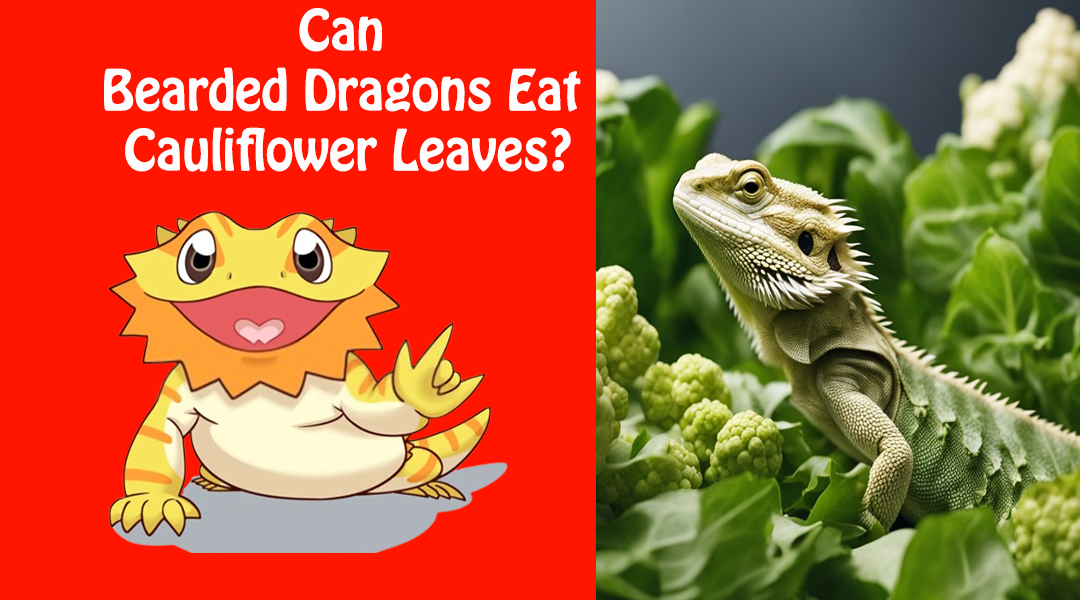Bearded dragons are omnivorous reptiles that require a balanced diet to maintain their health. As a result, many pet owners wonder what foods are safe to feed their bearded dragons and which ones should be avoided. One question that frequently arises is whether bearded dragons can eat cauliflower leaves.
Cauliflower is a nutritious vegetable that is rich in vitamins and minerals, making it a popular choice for human consumption. However, when it comes to feeding cauliflower leaves to bearded dragons, there are some important considerations to keep in mind. While bearded dragons can eat cauliflower leaves in moderation, it is important to ensure that they are thoroughly washed and free of any pesticides or other harmful chemicals. Additionally, it is important to remember that cauliflower leaves should only be a small part of a bearded dragon’s overall diet.
Overall, while bearded dragons can eat cauliflower leaves, it is important to do so in moderation and with caution. By following these guidelines, pet owners can ensure that their bearded dragons stay healthy and happy.
Bearded Dragon Diet Basics
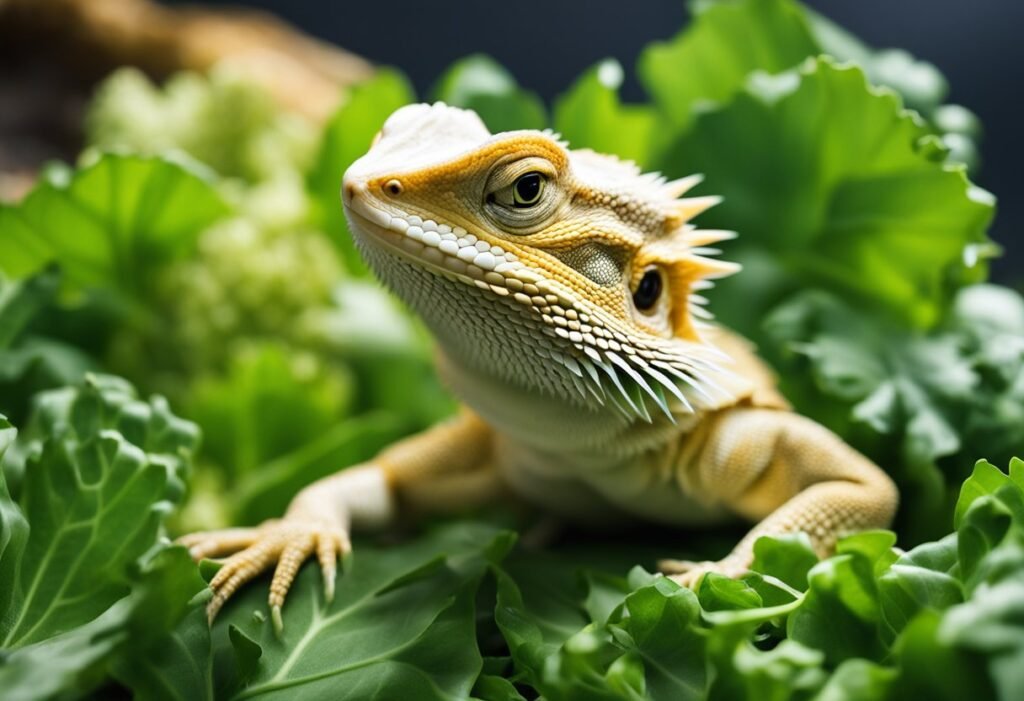
As responsible pet owners, we want to ensure that our bearded dragons are getting the proper nutrition they need to stay healthy and happy. A balanced diet is essential for these reptiles, and it’s important to know what foods are safe for them to eat.
Bearded dragons are omnivores, which means they eat both plants and animals. Their diet should consist of a variety of foods to ensure that they are getting all the necessary nutrients. Here are some basic guidelines to follow when feeding your bearded dragon:
Vegetables
Vegetables should make up a significant portion of your bearded dragon’s diet. Some safe options include:
- Collard greens
- Mustard greens
- Turnip greens
- Kale
- Carrots
- Squash
It’s important to note that not all vegetables are safe for bearded dragons. For example, spinach contains high levels of oxalates, which can bind to calcium and prevent it from being absorbed. Avoid feeding your bearded dragon spinach or other high-oxalate vegetables.
Protein
Bearded dragons also need protein in their diet. Some safe options include:
- Crickets
- Mealworms
- Dubia roaches
- Superworms
- Hornworms
It’s important to provide a variety of protein sources to ensure that your bearded dragon is getting all the necessary amino acids.
Fruits
Fruits should be fed in moderation, as they are high in sugar. Some safe options include:
- Apples
- Berries
- Mango
- Papaya
- Watermelon
It’s important to remove any seeds or pits from fruits before feeding them to your bearded dragon, as these can be a choking hazard.
Can Bearded Dragons Eat Cauliflower Leaves?
Cauliflower leaves are safe for bearded dragons to eat in moderation. However, they should not make up a significant portion of their diet. It’s important to provide a variety of vegetables to ensure that your bearded dragon is getting all the necessary nutrients.
In summary, a balanced diet is essential for the health and well-being of your bearded dragon. Providing a variety of vegetables, protein sources, and fruits in moderation will help ensure that they are getting all the necessary nutrients.
Nutritional Value of Cauliflower Leaves
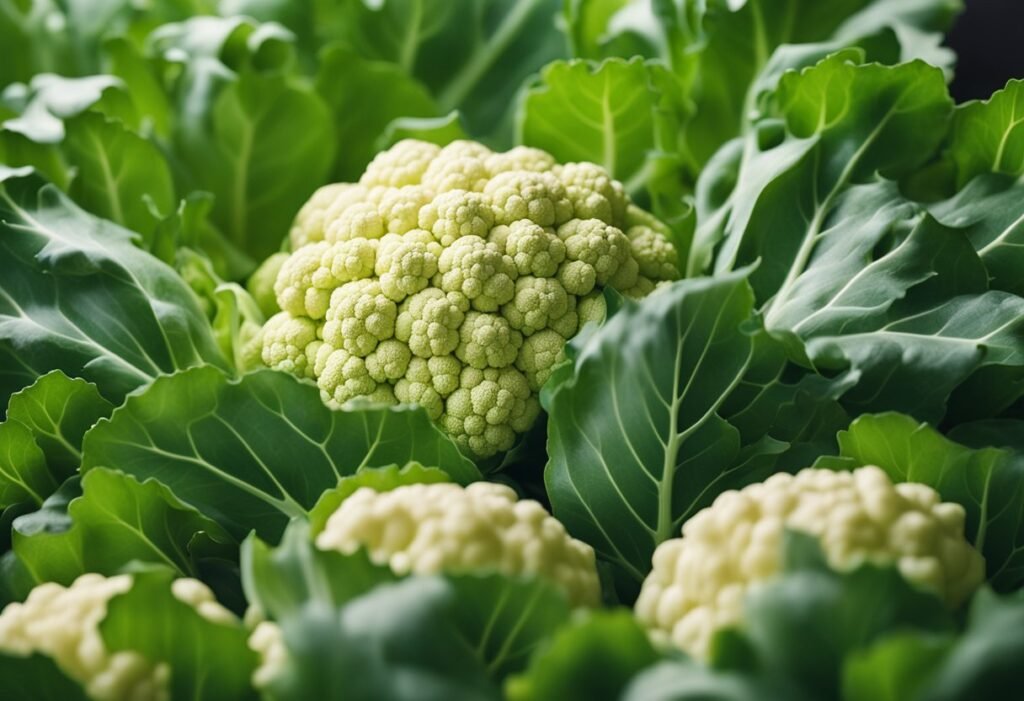
Cauliflower leaves are often overlooked as a food source, but they are actually quite nutritious. Here are some of the key nutrients found in cauliflower leaves:
- Vitamin C: One cup of chopped cauliflower leaves contains about 40% of the recommended daily intake of vitamin C. This antioxidant vitamin is important for immune function, skin health, and wound healing.
- Vitamin K: Cauliflower leaves are a good source of vitamin K, with one cup providing over 100% of the recommended daily intake. Vitamin K is important for blood clotting and bone health.
- Fiber: One cup of cauliflower leaves contains about 2 grams of fiber, which can help promote healthy digestion and reduce the risk of certain diseases.
- Calcium: Cauliflower leaves are a good source of calcium, with one cup providing about 10% of the recommended daily intake. Calcium is important for strong bones and teeth.
- Iron: One cup of cauliflower leaves contains about 10% of the recommended daily intake of iron. Iron is important for oxygen transport in the body and can help prevent anemia.
Overall, cauliflower leaves are a nutritious addition to your diet and can be a great source of vitamins and minerals. However, it is important to note that they should be thoroughly washed before consuming to remove any dirt or pesticides.
Benefits of Cauliflower Leaves for Bearded Dragons
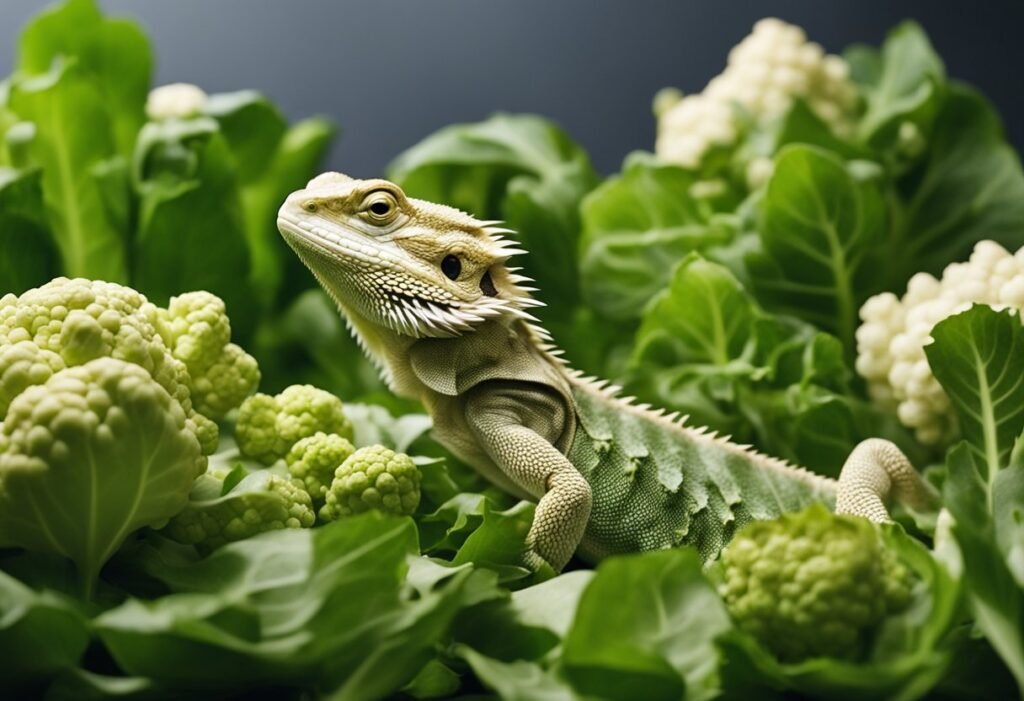
Cauliflower leaves are a nutritious addition to a bearded dragon’s diet. They are a good source of fiber, vitamins, and minerals that can help keep your pet healthy. Here are some benefits of feeding cauliflower leaves to your bearded dragon:
High in Fiber
Cauliflower leaves are high in fiber, which is important for maintaining healthy digestion in bearded dragons. Fiber helps regulate bowel movements and can prevent constipation. It also promotes the growth of beneficial bacteria in the gut, which can improve overall gut health.
Rich in Vitamins and Minerals
Cauliflower leaves are rich in vitamins and minerals that are essential for a bearded dragon’s health. They contain high levels of vitamin C, which is important for immune system function. They also contain vitamin K, which is important for blood clotting, and vitamin A, which is important for vision and skin health. In addition, cauliflower leaves are a good source of calcium, which is essential for bone health.
Low in Oxalates
Cauliflower leaves are low in oxalates, which are compounds that can bind to calcium and prevent its absorption. This makes cauliflower leaves a good source of calcium for bearded dragons, as they can absorb more of the calcium from this food than from foods that are high in oxalates.
Overall, cauliflower leaves are a nutritious and healthy food for bearded dragons. They can be fed raw or cooked, but should be washed thoroughly before feeding to remove any dirt or pesticides. Be sure to include a variety of other vegetables and fruits in your bearded dragon’s diet to ensure they are getting a balanced diet.
Risks of Feeding Cauliflower Leaves
Feeding your bearded dragon with cauliflower leaves can be risky. While cauliflower is generally safe for bearded dragons, its leaves contain certain compounds that can be harmful to your pet. Here are some of the risks associated with feeding cauliflower leaves to your bearded dragon:
Goitrogens
Cauliflower leaves contain goitrogens, which are substances that can interfere with the thyroid gland’s function. Goitrogens can cause the thyroid gland to enlarge, leading to a condition called goiter. This can affect your bearded dragon’s metabolism, growth, and development.
Oxalic Acid
Cauliflower leaves also contain oxalic acid, which can bind with calcium and other minerals in your bearded dragon’s body, preventing their absorption. This can lead to calcium deficiency, which can cause metabolic bone disease and other health problems.
Pesticides
Cauliflower leaves may also contain pesticides, which can be harmful to your bearded dragon’s health. Pesticides can cause a range of health problems, including neurological damage, liver and kidney damage, and cancer.
To minimize the risks associated with feeding cauliflower leaves to your bearded dragon, it is important to wash them thoroughly before feeding them to your pet. You can also limit the amount of cauliflower leaves you feed your bearded dragon, and alternate them with other safe vegetables.
Overall, while cauliflower leaves can be a nutritious addition to your bearded dragon’s diet, it is important to be aware of the risks and take steps to minimize them.
Proper Serving Size and Frequency
When it comes to feeding bearded dragons cauliflower leaves, it is essential to consider the proper serving size and frequency. As with any food, overfeeding can lead to health problems, while underfeeding can result in malnutrition.
We recommend serving cauliflower leaves as a small part of a varied diet, rather than as a staple food. A general rule of thumb is to feed your bearded dragon a variety of vegetables, fruits, and insects, with vegetables making up around 20-30% of their diet.
When serving cauliflower leaves, it is important to chop them into small pieces to prevent choking or digestive issues. We recommend serving around 1-2 small pieces per feeding, depending on the size of your bearded dragon.
In terms of frequency, we suggest feeding cauliflower leaves once or twice a week, depending on the overall diet of your bearded dragon. It is important to note that bearded dragons require a balanced diet with a variety of nutrients, so feeding them too much of one food can lead to deficiencies in other areas.
Overall, while cauliflower leaves can be a healthy addition to a bearded dragon’s diet, it is important to serve them in moderation and as part of a varied diet. By following these guidelines, you can ensure that your bearded dragon receives the proper nutrition they need to thrive.
Preparation of Cauliflower Leaves for Bearded Dragons
When it comes to feeding bearded dragons, it is important to provide them with a balanced and varied diet. While they primarily eat insects and vegetables, it is important to ensure that the vegetables are prepared correctly to avoid any health issues.
Cauliflower leaves are a nutritious option for bearded dragons, but they must be prepared properly before feeding. Here are some steps to follow:
- Wash the cauliflower leaves thoroughly to remove any dirt or debris.
- Remove any tough stems or veins from the leaves.
- Cut the leaves into bite-sized pieces.
- Steam or blanch the leaves for a few minutes to make them easier to digest.
- Allow the leaves to cool before feeding them to your bearded dragon.
It is important to note that cauliflower leaves should only be fed to bearded dragons in moderation. While they are a good source of fiber and vitamins, they also contain goitrogens which can interfere with thyroid function if consumed in large quantities.
In conclusion, cauliflower leaves can be a healthy addition to a bearded dragon’s diet when prepared properly. However, it is important to feed them in moderation and ensure that they are not the sole source of vegetables in their diet.
Alternatives to Cauliflower Leaves
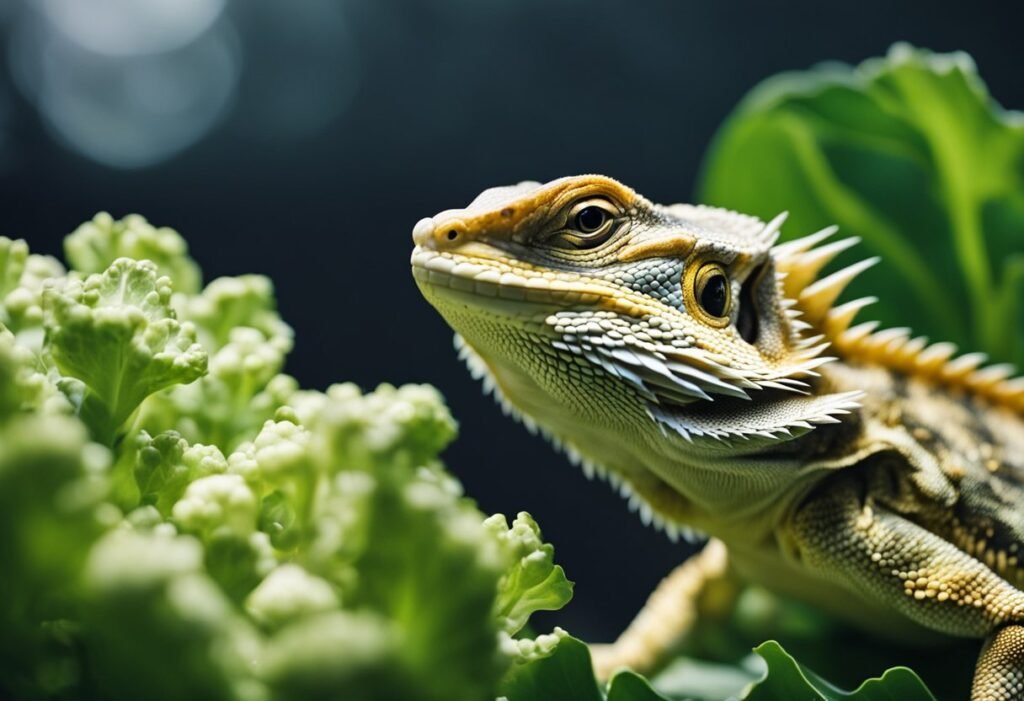
While cauliflower leaves are safe for bearded dragons to eat, some owners may prefer to offer a variety of greens to their pets. Here are some alternatives to cauliflower leaves that you can consider:
Mustard Greens
Mustard greens are a great source of calcium, vitamin A, and vitamin C. They also have a strong flavor that some bearded dragons may enjoy. However, it’s important to note that mustard greens contain goitrogens, which can interfere with thyroid function if fed in large quantities. As with any new food, introduce mustard greens gradually and monitor your pet for any adverse reactions.
Collard Greens
Collard greens are another calcium-rich option for bearded dragons. They also contain vitamin A and fiber, which can help with digestion. However, they are low in vitamin C, so it’s important to offer other greens or vegetables that are high in this nutrient. Collard greens can be fed raw or cooked, but avoid seasoning them with salt or other spices.
Dandelion Greens
Dandelion greens are a nutritious and easy-to-find option for bearded dragons. They are high in calcium, vitamin A, and vitamin C, and are also a good source of fiber. Dandelion greens can be fed raw or cooked, but make sure to wash them thoroughly to remove any pesticides or other contaminants.
Endive
Endive is a leafy green that is high in vitamin A and fiber, and low in oxalates, which can interfere with calcium absorption. It also has a slightly bitter taste that some bearded dragons may enjoy. Endive can be fed raw or cooked, but avoid adding any oils or dressings.
Overall, there are many safe and nutritious alternatives to cauliflower leaves that you can offer your bearded dragon. Experiment with different greens to see which ones your pet prefers, and remember to offer a variety of foods to ensure a balanced diet.
Monitoring Your Bearded Dragon’s Health
As responsible pet owners, it is important to monitor our bearded dragon’s health regularly. This includes observing their behavior, appetite, and physical appearance.
One way to ensure your bearded dragon is healthy is to provide a balanced and varied diet. While cauliflower leaves are safe for bearded dragons to eat, it should not be the only vegetable in their diet. It is important to offer a variety of vegetables, such as collard greens, kale, and squash, to ensure they receive all the necessary nutrients.
Another way to monitor your bearded dragon’s health is to observe their bowel movements. A healthy bearded dragon should have regular bowel movements that are well-formed and not too runny or too hard. If you notice any changes in their bowel movements, it could be a sign of illness and should be addressed by a veterinarian.
In addition to diet and bowel movements, it is important to regularly check your bearded dragon’s physical appearance. Look for any signs of injury, such as cuts or abrasions, and check for any abnormalities in their skin or scales. If you notice any changes, it is best to consult with a veterinarian to ensure your bearded dragon is healthy.
By monitoring your bearded dragon’s health regularly, you can ensure they are happy and healthy pets.
Frequently Asked Questions
Is it safe for bearded dragons to consume raw cauliflower leaves?
Yes, it is safe for bearded dragons to consume raw cauliflower leaves. However, it’s important to note that cauliflower leaves should only be given in moderation and as part of a balanced diet.
How often can bearded dragons have cauliflower leaves in their diet?
Bearded dragons can have cauliflower leaves in their diet occasionally, but not on a regular basis. It’s recommended to offer a variety of vegetables to ensure a balanced diet and to avoid overfeeding any one type of food.
Are broccoli leaves a suitable food for bearded dragons?
Yes, broccoli leaves are a suitable food for bearded dragons. They are high in fiber and nutrients and can be offered as part of a varied diet.
What types of cabbage are appropriate for bearded dragons to eat?
Bearded dragons can eat a variety of cabbage, including green cabbage, red cabbage, and savoy cabbage. However, it’s important to note that cabbage should only be given in moderation as it can cause gas and digestive issues in some bearded dragons.
Can feeding carrots to bearded dragons be part of a healthy diet?
Yes, feeding carrots to bearded dragons can be part of a healthy diet. Carrots are high in vitamin A and other nutrients that are beneficial for bearded dragons. However, they should be given in moderation as they are also high in sugar.
What leafy greens should be avoided when feeding bearded dragons?
Bearded dragons should avoid eating spinach and Swiss chard as they contain high levels of oxalates, which can bind to calcium and cause health issues. Other leafy greens, such as kale and collard greens, should also be given in moderation as they are high in calcium and can cause health issues if overfed.

I, Mark Antonelli am highly interested in pet care tips. The experiences I gained through university life in animal sciences were also helpful to identify the best tricks for caring for and feeding varying kinds of pets. I know the majority of people love to own a pet. Yet, there is a guilty of owing a Bearded Dragon due to a lack of information about how much friendly and peaceful they are. I thought of filling this gap with detailed writings about this Pogona genus Bearded Dragon. All my team is also giving me great support to fulfil my mission. Hope you will enjoy the journey with us.

